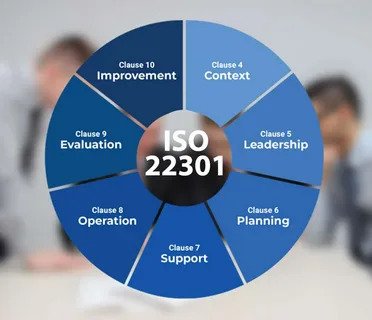
Table of Contents
-
Introduction
-
What is ISO 22301 Business Continuity?
-
Why ISO 22301 Matters for Modern Businesses
-
Key Benefits of Implementing ISO 22301
-
Core Requirements of ISO 22301
-
How to Achieve ISO 22301 Certification
-
ISO 22301 vs Other ISO Standards
-
Industries That Need ISO 22301 Most
-
The Role of Disaster Recovery and Risk Management
-
Partnering with the Right ISO Certification Services
-
Conclusion
-
FAQs
Introduction
Have you ever thought about what would happen if your business suddenly faced a crisis? A cyberattack, a flood, a supply chain failure—disasters don’t knock on your door before entering. This is where ISO 22301 Business Continuity becomes your safety net.
In today’s unpredictable world, resilience isn’t optional; it’s survival. Businesses that plan for disruptions not only survive but thrive when others collapse. Let’s dive deep into why ISO 22301 is the ultimate game-changer.
What is ISO 22301 Business Continuity?
ISO 22301 is an international standard for Business Continuity Management Systems (BCMS). In plain English, it’s a blueprint that helps organizations prepare, respond, and recover from disruptions effectively.
Think of it as an insurance policy—not for your building, but for your business operations. While insurance gives you money after damage, ISO 22301 keeps your business running even during a crisis.
Why ISO 22301 Matters for Modern Businesses
Businesses today operate in a volatile environment. From cyber threats to natural disasters, the risks are endless. Without a solid business continuity plan, you could face:
-
Revenue losses
-
Customer trust issues
-
Legal and regulatory penalties
ISO 22301 ensures your company has a proactive system to handle any disruption, big or small.
Key Benefits of Implementing ISO 22301
Why should you invest in this certification? Here’s what you gain:
1. Unmatched Resilience
When unexpected events occur, ISO 22301 ensures you bounce back fast. Your team knows what to do—no chaos, no panic.
2. Enhanced Customer Trust
Clients love reliability. Proving your commitment through ISO 22301 tells them, “We’ve got you covered—even in a crisis.”
3. Legal and Regulatory Compliance
Many sectors require robust continuity measures. ISO 22301 keeps you compliant with laws and regulations.
4. Competitive Advantage
Want to stand out in your industry? ISO 22301 is a badge of trustworthiness.
Core Requirements of ISO 22301
To comply with ISO 22301, your organization needs to implement:
-
Business Impact Analysis (BIA): Identify critical processes and risks.
-
Risk Assessment: Spot potential threats and weak points.
-
Continuity Strategies: Create clear action plans for emergencies.
-
Regular Testing: Practice drills to ensure the plan works.
-
Continuous Improvement: Keep updating as risks evolve.
How to Achieve ISO 22301 Certification
Getting certified involves these steps:
-
Gap Analysis: Find out where you stand.
-
Documentation: Prepare policies, objectives, and procedures.
-
Implementation: Train staff and put processes in place.
-
Internal Audit: Check compliance internally.
-
External Audit: An accredited body validates your BCMS.
Partnering with ISO certification services in the UK or trusted global providers can make this journey smooth.
ISO 22301 vs Other ISO Standards
How does it compare with other certifications?
-
ISO 9001 (Quality Management): Focuses on quality of products/services.
-
ISO 27001 (Information Security): Protects data security compliance.
-
ISO 14001 (Environmental Management): Deals with sustainable energy practices.
ISO 22301 complements these standards, giving you a holistic risk management approach.
Industries That Need ISO 22301 Most
While every organization can benefit, these sectors need it urgently:
-
Finance: To manage cyber and operational risks.
-
Healthcare: For disaster recovery planning.
-
Manufacturing: To keep supply chains running.
-
IT Services: To maintain uptime during cyber threats.
The Role of Disaster Recovery and Risk Management
ISO 22301 is not just about continuity; it ties closely with:
-
Disaster Recovery Planning – Quick recovery after disruptions.
-
Occupational Risk Management – Keeping workplaces safe during crises.
-
Device Safety and Performance – Ensuring critical equipment works in emergencies.
Partnering with the Right ISO Certification Services
Getting the right support is key. Look for services that provide:
-
Tailored solutions for your industry
-
Expertise in ISO 22301 audits and training
-
Affordable packages for small businesses in the UK
Reliable providers like ISO certification service London can help you achieve compliance without the headaches.
Conclusion
Business disruptions are inevitable, but failure is not an option. ISO 22301 gives your organization the power to adapt, respond, and thrive under pressure. Whether you’re a small business or a multinational, resilience is the new currency—and ISO 22301 is your ticket to earning it.
Ready to future-proof your business? Start your ISO 22301 Business Continuity journey today.
FAQs
1. What is ISO 22301 Business Continuity?
It’s an international standard that helps organizations create a strong Business Continuity Management System to handle disruptions effectively.
2. Who needs ISO 22301 certification?
Any organization that values operational resilience, especially those in finance, healthcare, manufacturing, and IT.
3. How long does it take to get certified?
On average, it takes 3–6 months depending on your organization’s size and readiness.
4. Is ISO 22301 mandatory?
Not legally in most regions, but many clients and regulators prefer or require it.
5. How does ISO 22301 relate to disaster recovery planning?
Disaster recovery is a key component of ISO 22301, ensuring quick restoration of operations after a crisis.
Sponsored article: What Sets a Denton Criminal Defense Attorney Apart from a Public Defender?


